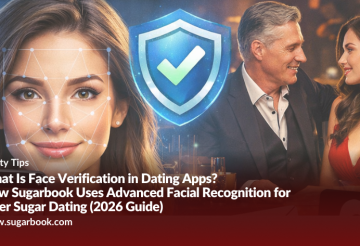
Meet successful sugar daddies and confident sugar babies on the world’s leading sugar dating app. Join free today.
📌 Editor’s Note (Updated January 2026): As digital security in the United States evolves, this guide has been audited for the new year. It provides updated insights on how to identify fraudulent behavior and establish an honest & beneficial relationship with total peace of mind.
Contents
- What Does ‘Sugar Daddy Scam’ Really Mean in the US Today?
- Why ‘sugar daddy scam’ Is Trending in the US Sugar Dating World
- Sugar Daddy Scam in the US: How to Navigate This Safely and Smartly
- Sugar Daddy Scam in the US: Protecting Your Profile and Privacy
- Sugar Daddy Scam in the US: Communication Tips
- Sugar Daddy Scam in the US: Staying Safe Online and Offline
- Pros and Cons of sugar dating despite sugar daddy scam risks
- Conclusion: The Future of Scam Awareness and Secure Dating in 2026
- FAQ: Safe Sugar Dating in the United States 2026
What Does ‘Sugar Daddy Scam’ Really Mean in the US Today?
Understanding 2026 Fraud Tactics in the American Dating Scene
In 2026, more Americans than ever are searching for the term “sugar daddy scam” to identify emerging digital threats. A scam occurs when a fraudulent actor pretends to be a successful professional to exploit others—usually by requesting upfront payments, sensitive banking information, or making false promises of lifestyle support.
In the United States, these bad actors often target students and ambitious professionals looking for beneficial connections on various apps. In the modern era, scammers have become more sophisticated, using AI-generated photos and emotional language to make their profiles feel believable. Staying safe requires a commitment to honest & beneficial relationships established through verified channels.
How Scams Evolve in the Modern US Sugar Dating World
In today’s elite dating scene in hubs like NYC and Los Angeles, a sugar daddy scam in the US typically follows these patterns:
- The “Verification Fee” Trap: Fake profiles offering high-caliber agreed arrangements but demanding a small “onboarding fee” or “processing charge” first.
- Fake Payment Proof: Scammers sending doctored screenshots of digital transfers and asking for a portion of the funds to be “returned” via crypto or gift cards.
- Information Phishing: Requests for bank login credentials or SSNs as a “test of trust” before establishing an honest & beneficial relationship.
While the methods change, the goal remains the same: exploiting the desire for a beneficial connection. By identifying these red flags instantly, you protect your identity and your future success.
Why ‘sugar daddy scam’ Is Trending in the US Sugar Dating World
Shifting dating culture and rising online risks
Sugar dating is no longer taboo in the US. Millions openly join platforms to meet sugar daddies or sugar babies. But as it becomes mainstream, scammers see it as an easy target, leading to more people Googling sugar daddy scam to protect themselves.
Social media makes sharing stories easier. US sugar babies warn each other in forums and TikTok videos, using the term sugar daddy scam to help newcomers avoid mistakes.
Real stories help US users realize they’re not alone, and that safe sugar dating is possible when they stay alert.
Red flags to watch out for in sugar daddy scam
US sugar babies share these warning signs:
-
Sugar daddies who rush to talk about money before meeting.
-
Requests to pay “release fees,” “verification,” or “taxes.”
-
Profiles with few photos or stolen images.
-
Poor grammar or strange payment requests.
If it sounds too good to be true, it often is.
Tips from real Sugarbook users in the US
On Sugarbook, US sugar babies often recommend:
-
Never pay a sugar daddy first.
-
Keep early conversations on the platform.
-
Video call before sharing personal details.
-
Ask for slow, honest conversations, not flashy offers.
These habits help avoid falling into sugar daddy scams.
Best platforms to avoid sugar daddy scam in the US
US users choose platforms like Sugarbook because:
-
Verified sugar daddies reduce fake profiles.
-
Reporting tools block scammers.
-
Privacy features protect photos and messages.
While no site is perfect, trusted platforms lower risk.

Sugar Daddy Scam in the US: Protecting Your Profile and Privacy
Choosing photos carefully to reduce scam risk
-
Use high-quality but not overly revealing photos.
-
Avoid sharing where you live, work, or study.
-
Change profile pics occasionally.
This makes it harder for scammers to steal your photos or target you.
Writing an authentic bio that attracts real sugar daddies
-
Clearly share what you’re looking for (travel, mentorship, etc.).
-
Avoid words like “desperate” or “need money fast.”
-
Keep tone confident and friendly.
Real US sugar daddies prefer honesty; scammers prey on desperation.
Sugar Daddy Scam in the US: Communication Tips
Starting conversations safely
-
Start by asking about lifestyle, hobbies, and goals.
-
Notice if replies seem copy-pasted or too fast.
-
Avoid giving bank info, personal email, or address early on.
Genuine sugar daddies want to talk; scammers push for payment.
Discussing allowances and arrangements the smart way
-
Talk about allowance only after trust is built.
-
Use clear language “monthly,” “per meet,” or “support.”
-
Avoid anyone asking you to “prove trust” with money.
In the US sugar dating scene, clarity protects both sugar babies and daddies.
Sugar Daddy Scam in the US: Staying Safe Online and Offline
Even as sugar dating becomes more accepted in the US, the threat of a sugar daddy scam remains real. Staying cautious helps protect your safety both online and in real life.
Verifying sugar daddies in the US
Before meeting a potential sugar daddy offline:
-
Arrange at least one video call to confirm identity.
-
Check if details they share match what’s visible on social media.
-
Ask polite questions about work, travel, or daily life—real sugar daddies won’t mind.
US sugar babies on platforms like Sugarbook say verification is the first step to avoiding a sugar daddy scam.
Avoiding common traps and fake payment scams
Many sugar daddy scams trick US users by pretending to send money:
-
The scammer sends a fake PayPal or bank screenshot.
-
They ask the sugar baby to “return” part of the payment.
-
They push for gift cards or “processing fees.”
The rule is simple: real sugar daddies won’t ask for money first. When in doubt, pause and check.
Pros and Cons of sugar dating despite sugar daddy scam risks
While a sugar daddy scam is a real risk, millions in the US still explore sugar dating because of its genuine benefits.
Benefits when done safely
-
Financial support for school, rent, or travel.
-
Networking and mentorship from successful sugar daddies.
-
Luxury experiences like dining out or vacations.
-
Honest conversations about expectations, more clarity than traditional dating.
Many US sugar babies say sugar dating helps them focus on careers or studies without financial stress.
Emotional and financial challenges for US users
-
The fear of being scammed.
-
Judgment from friends or family.
-
Real feelings might develop, making arrangements more complicated.
-
Cultural differences if connecting with international sugar daddies.
Yet, US users often share that honesty, strong boundaries, and using trusted platforms make sugar dating rewarding—even if they stay alert to sugar daddy scam signs.
Conclusion: The Future of Scam Awareness and Secure Dating in 2026
By 2026, premium members in the United States have become significantly more sophisticated regarding digital safety. The reality is that while the elite dating landscape offers incredible opportunities, the key to success is remaining vigilant against bad actors. Establishing an honest & beneficial relationship is the best way to ensure your journey is safe and rewarding.
The most effective ways to protect your success in 2026 include:
- Identifying the red flags of a sugar daddy scam instantly.
- Exclusively using verified platforms like Sugarbook.
- Communicating your boundaries clearly within an agreed arrangement.
In the end, elite dating in the US continues to offer unparalleled mentorship, lifestyle enhancement, and genuine connection—provided you stay informed and prioritize beneficial connections built on a foundation of verified trust.
💡 2026 Safety Takeaways
- Verify Before Connecting: Only establish an honest & beneficial relationship with members who have completed face-verification on Sugarbook.
- On-Platform Security: Keep initial discussions within the app’s secure environment to protect your personal data from sugar daddy scams in the US.
- Financial Transparency: A legitimate agreed arrangement is settled through upfront honesty and never requires you to pay “onboarding fees.”
- Trust Your Standards: If a dynamic feels purely transactional or high-pressure, prioritize your safety and step back.
FAQ: Safe Sugar Dating in the United States 2026
1. Are sugar daddy scams still common in the US in 2026?
While awareness is rising, bad actors still use social media to target beginners. The best protection is establishing an honest & beneficial relationship on verified platforms like Sugarbook, where security is a priority.
2. How do I know if a Sugar Daddy in the US is legitimate?
A legitimate partner will respect your boundaries, complete their face-verification, and be clear about the terms of an agreed arrangement without requesting upfront payments or sensitive financial data.
3. Can premium dating in the US be truly secure?
Absolutely. By using secure platforms and prioritizing beneficial connections, you can enjoy a safe experience. Avoid random DMs and ensure your connection is established through an honest & beneficial relationship standard.
4. What is the biggest red flag of a scam in 2026?
The primary red flag is a request for “clearance fees” or bank login information. A genuine match will value an agreed arrangement built on mutual respect and will never compromise your financial security.
5. Should I ever pay a partner to receive support?
No. In an honest & beneficial relationship, support is provided directly as part of an established agreed arrangement. Anyone asking you to pay them first is a fraudulent actor; you should block and report them immediately.
Expand Your 2026 Safety Knowledge:













